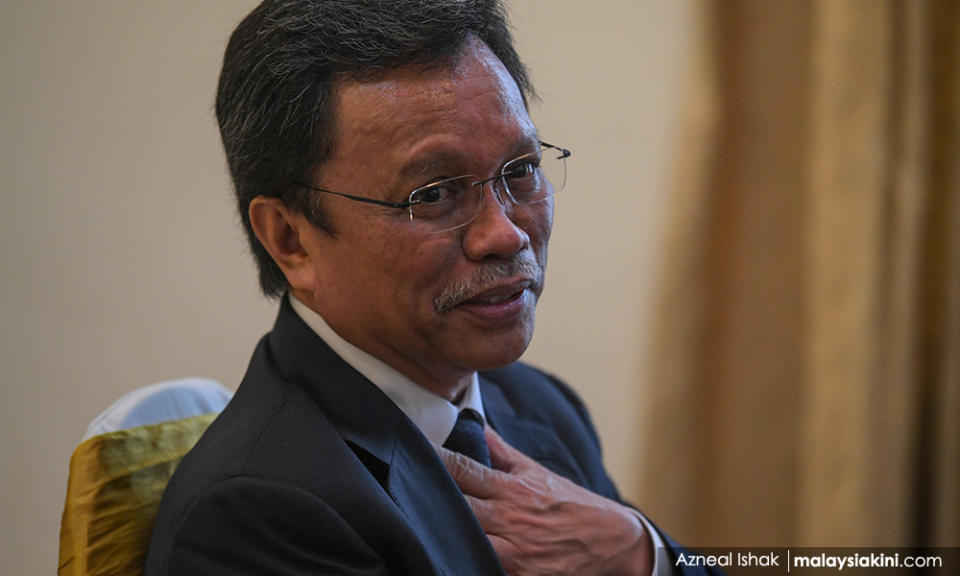Wan Fayhsal: Bersatu a more progressive force within PN

When Bersatu president Muhyiddin Yassin decided to take his party out of Pakatan Harapan to form the new Perikatan Nasional government with the likes of Umno and PAS, critics saw Bersatu setting itself on the path of doom.
The fact that the three Malay-based parties share a similar support base raised concerns that the more established Umno and PAS could end up dominating Bersatu.
However, Deputy Youth and Sports Minister Wan Ahmad Fayhsal Wan Ahmad Kamal, who is vying for the top post in Bersatu Youth, believed Bersatu has a lot more to offer to Malaysians compared to its PN allies.
Speaking to Malaysiakini and Bicara Minggu Ini in an interview, Wan Fayshal said the party might be the youngest in PN, but it is more inclusive to youths and other Bumiputera groups.
"We are the most progressive thus far among all the Malay parties.
"We are more nimble, we are more flexible, and we are more open. As you can see, like myself, even a Bersatu youth (member) can become the chief of party divisions in certain places," he said.
"We are more open. We are not coloured by legacy issues, controversies like what happened in other parties.
"And I believe this would create more positive vibes for Malay youths especially to join us so we can become an alternative for the constituents," Wan Fayhsal added.
He was referring to his recent win as the Titiwangsa Bersatu division chief. Wan Fayhsal is also running to become the chief of Armada, the Bersatu Youth wing.

According to the senator, the strength of Bersatu also lies in its name - Parti Pribumi Bersatu Malaysia - which aimed at larger groups and not only Malays.
This was in contrast with Umno and PAS, which mainly target the support of the Malay Muslims in the peninsula but are weak in the Borneo states. While Umno has a significant presence in Sabah, its presence in the state was greatly weakened after the 2018 general election.
The Borneo states of Sabah and Sarawak are the home ground of 59 Bumiputera ethnicities who share different religious backgrounds.
"Even in Sabah and Sarawak, we have members and leaders among the Kadazan Dusun ethnic, among the bumiputeras there. So they are not being treated as second-class leaders in Bersatu.
"So in that sense, we are more open, more tolerant of various views and positions. And we hope by having this kind of character, we can entice more youths especially in urban areas to be with us."
'PN moving towards the right direction'
Asked about the overall direction of PN, particularly on the friction between Bersatu and Umno that appeared to intensify after former prime minister Najib Abdul Razak's conviction in his SRC trial, the 33-year-old acknowledged the realities on the ground that Umno must be dealt with.
Wan Fayhsal admitted that Umno president Ahmad Zahid Hamidi's announcement shortly after Najib's conviction that Umno won't join PN if it formalised as a coalition caught many in Bersatu off guard.
"Nonetheless, we do understand why the president of Umno made such a statement, given the tension at the grassroots level in Umno itself with regard to having Bersatu onboard," Wan Fayhsal said.
Umno has instead asked Bersatu to join Muafakat Nasional, which is an Umno-PAS alliance.
PN is an informal coalition formed between Bersatu, PKR defectors, BN, PAS, GPS, PBS and STAR to take over from the Harapan government which collapsed in late February.
Wan Fayhsal said the Malay unity objective had already been achieved, but there is now a need to build a broader coalition.
"It depends on the objective of the coalition. If the coalition targets to unite all Malays or Bumiputera, I think either Muafakat Nasional or PN, we have achieved that. And what we want to do next is basically to be more inclusive, regionally speaking.
"Because if you noticed, Muafakat Nasional is pretty much peninsular centric. By having PN onboard, or as a larger umbrella, I think we can be more inclusive with smaller component parties in Sabah and Sarawak.
"I think that's what we are aiming for. To show Malaysians that we can be a coalition that can be an umbrella for everyone," he said.

Wan Fayhsal expressed his optimism that Muhyiddin and Zahid could overcome these issues as both had come a long way together in politics.
Despite the differences, Wan Fayhsal believed that the PN government won't repeat the mistakes of the Harapan government where mid-level politicians attacked coalition partners in public over disagreements.
"I think we have learned from Harapan's mistakes where squabbles are being made public."
Admitting that there were some public tensions between PN parties, Wan Fayhsal said he believed that they were still going in the right direction under Muhyiddin's leadership.
However, the next test for PN, and particularly Umno and Bersatu, will be in Sabah.
'Bersatu has strong footing in Sabah'
On July 30, Sabah chief minister Shafie Apdal announced the dissolution of the state legislative assembly, a move the Warisan president had taken as a last-ditch effort to stop a political coup engineered by Umno's Musa Aman.
Thrust into a sudden snap poll, Umno and Bersatu have traded barbs over the allocation of seats.

It started with Umno information chief Shahril Hamdan telling off Sabah Bersatu chief Hajiji Noor for saying that Bersatu will contest 45 out of 73 seats, which prompted Wan Fayhsal to chastise Shahril.
Asked about the spat, Wan Fayhsal said the Umno leader did not understand Bersatu's strength in the East Malaysia state.
"We have 500 branches and about 25 divisions in Sabah, and thousands of members. In fact, it is the largest group throughout Malaysia.
"So, definitely the popularity of Bersatu in Sabah is quite big and it's a force to be reckoned with," he stressed.
This, however, does not mean that Bersatu would bulldoze its plan in Sabah.
Wan Fayhsal said the party was ready to negotiate with all parties in the state, including Umno, hoping to at least arrive at a consensus that they would only face Warisan as an opponent instead of each other.

